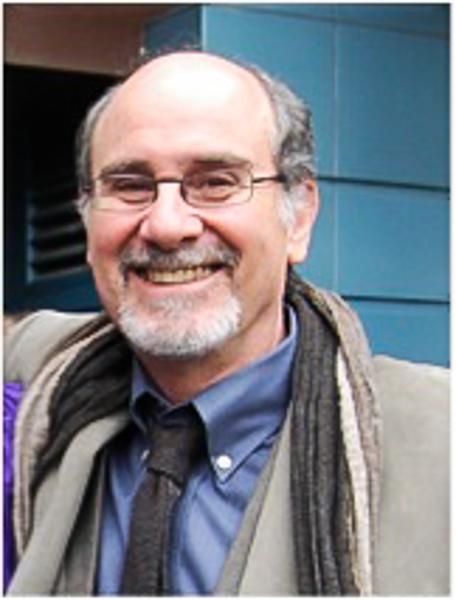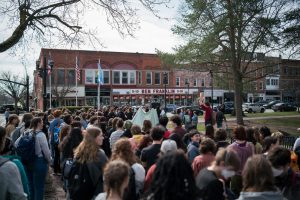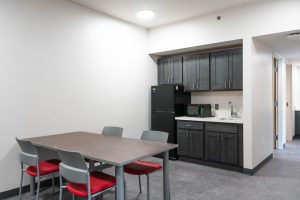Off the Cuff: Steve Volk, Professor of History
September 18, 2015
Steve Volk is a professor of History and founding director of the Center for Teaching Innovation and Excellence at Oberlin. In 2011, the Council for Advancement and Support of Education and the Carnegie Foundation for the Advancement of Teaching named him U.S. Professor of the Year. He is also on the editorial board of the journal Latin American Perspectives. Volk recently gave a lecture at Spanish House titled Salvador Allende: Life and Death.
What made you interested in studying Salvador Allende?
Well that’s going back a long time. I went to Chile for the first time as a high school student in 1963, so I’ve sort of been associated with that country for almost half a century now. I also lived in Chile during Allende’s government. I was there in ’72 and ’73. I was there, as I put it, for the good, the bad and the ugly. I left about six to eight weeks after the coup that overthrew him in 1973.
So it’s more than an object of study to me: It’s about my life. It took me a fair amount of time before I actually wanted to go back and look at it as a subject of study, but now I’ve been doing that for quite a long time. I’ve just finished a biography of Allende, so I’m quite interested in him as a person as well as the events that took place in Chile.
What did you witness when you were in Chile? How aware were you of the political situation?
There was no way to be in Chile without being part of that process. I went to Chile to do my dissertation, but it would be wrong to say I went because of the dissertation. I went to Chile because it was a world historical event, and I had to see what was going on. So in many ways, aside from doing my dissertation work, I played an active role in the life and the politics of the country.
I was a member of a very small group who wrote a newspaper called the North American Information Source, and we sort of provided news about the left in the United States to the Chileans and about the economic boycott of Chile. There were about eight of us and two of those people, Charlie Horman and Frank Teruggi, were killed after the coup. Charlie Horman was the person that Costa-Gavras did the film Missing about. So it hit very close to home to see your friends be killed, to see the U.S. government complicit in the deaths of American citizens and try to cover it up for decades.
What did you find out about Allende’s personal life, and how did his personal life influence his politics?
I think what I came away with at the end of the project is a huge amount of respect for him, which I think I always had at one level, but there’s aspects about his life that are so consistent and so principled and ultimately so revolutionary and democratic. I was truly impressed when I began to sort of see him unfold as a political person. He was one of the founders, or close to being a founder, of the Socialist Party of Chile in 1933.
But what made him a revolutionary, what made him care about those things that revolutionaries care about, which is the well-being of those less fortunate or those who aren’t well off in society, is not necessarily theory. Although he did read theory, and he was a Marxist; there’s no question about that. But it was his personal experience. He trained as a medical doctor. The whole Allende family, going back a few hundred years, were always professionals. They were either doctors or lawyers, and he chose the profession of doctor. But as opposed to many in his family, he began to practice in the poorer areas of Santiago; that’s where he lived when he went to medical school.
It’s his experience that brought him his politics. It’s Marxism that gave him a sense of understanding, but because experience was primary, he never became an orthodox theorist, and he was willing to change pragmatically to understand what the people really need, rather than “what does the theory say?”
He ran for president unsuccessfully three times before winning on his fourth try. What made the 1970 election different?
It was only the very first time when he was still quite young that he didn’t do well. He only got five percent of the vote. He narrowly missed being elected in 1958 by the slimmest of margins, by less than 30,000 votes. He lost by a larger margin in 1964, and that’s because the U.S. stepped into that campaign. The CIA financed the opposition to the tune of $4 million and forced one of the candidates off the ticket altogether.
But in 1970, a variety of things came together. The centrist Christian democrat party had just been in power, and it became quite unpopular because of being unable to accept things. The second is that the United States might have been a bit more asleep at the wheel than it was in 1964. Their internal assessments from their own documentation suggests that they really didn’t think that Allende would win, and so because they didn’t put much into that campaign, and because Allende always drew from the same strength that he did, he squeaked in by about 39,000 votes. He could have easily won in 1958 but didn’t.
What was the CIA’s role in the 1973 coup?
There’s not a whole lot of evidence; there’s some indications that the U.S. was involved on the day of the coup, but really what it did was prepare the groundwork for the Chilean military to take over, and for that there’s huge amounts of documentation.
We know right off the bat that the U.S. supported an attempt to prevent Allende from being confirmed by Congress after being elected. … The U.S. fostered a plan to kidnap the commander in chief of the armed forces. They killed him in the process — they were going to blame it on the left and encourage a military coup. The fact that Kissinger said that this is the greatest threat the United States has faced in Latin America ever and that it would not stand for an Allende presidency — all of these things are on the record. What’s also on the record is the large amount of money that the CIA spent on a variety of opposition activities: building an economic boycott of Chile, making it harder for the middle classes to exist in Chile during this time.
All of those things essentially were geared towards making it much more likely that the military would decide to move. The U.S. didn’t have to convince the military to make that decision, but it did have to create a condition where it would be the only possibility, and there’s absolutely no question that the U.S. played the key role in that.
Why was the U.S. so afraid of Allende? Was it just fear of Soviet influence in Latin America?
What the U.S. feared in Chile are two things. Of course, this is the Cold War period, so they’re looking at the Soviet Union, but when Kissinger in 1970 said the election of Allende would be the worst threat we face in Latin America, you have to then ask, “What’s that threat?” And the threat is not communism, because Cuba comes before that. The threat is democratic socialism, that people will actually elect a socialist who will do well — the threat of a good example. What becomes the threat for the U.S. is democracy and elections rather than communism.
The second thing, which is even more disturbing, is that when you look through U.S. State Department records and Kissinger’s records, what becomes clear is that Kissinger really could not give a damn about Latin America or about Chile. He once called Chile “The dagger that’s pointed at Antarctica.” He’s quite Eurocentric and doesn’t think Latin America is important. What he worried is that NATO countries — particularly Italy and Germany and France — would see the example of Chile, whereby they elect democratically a communistsocialist alliance that comes to power and does well. All of those other countries that he did care about had communists and socialists as part of their parties. His worry was that it would be copied in Europe.


























